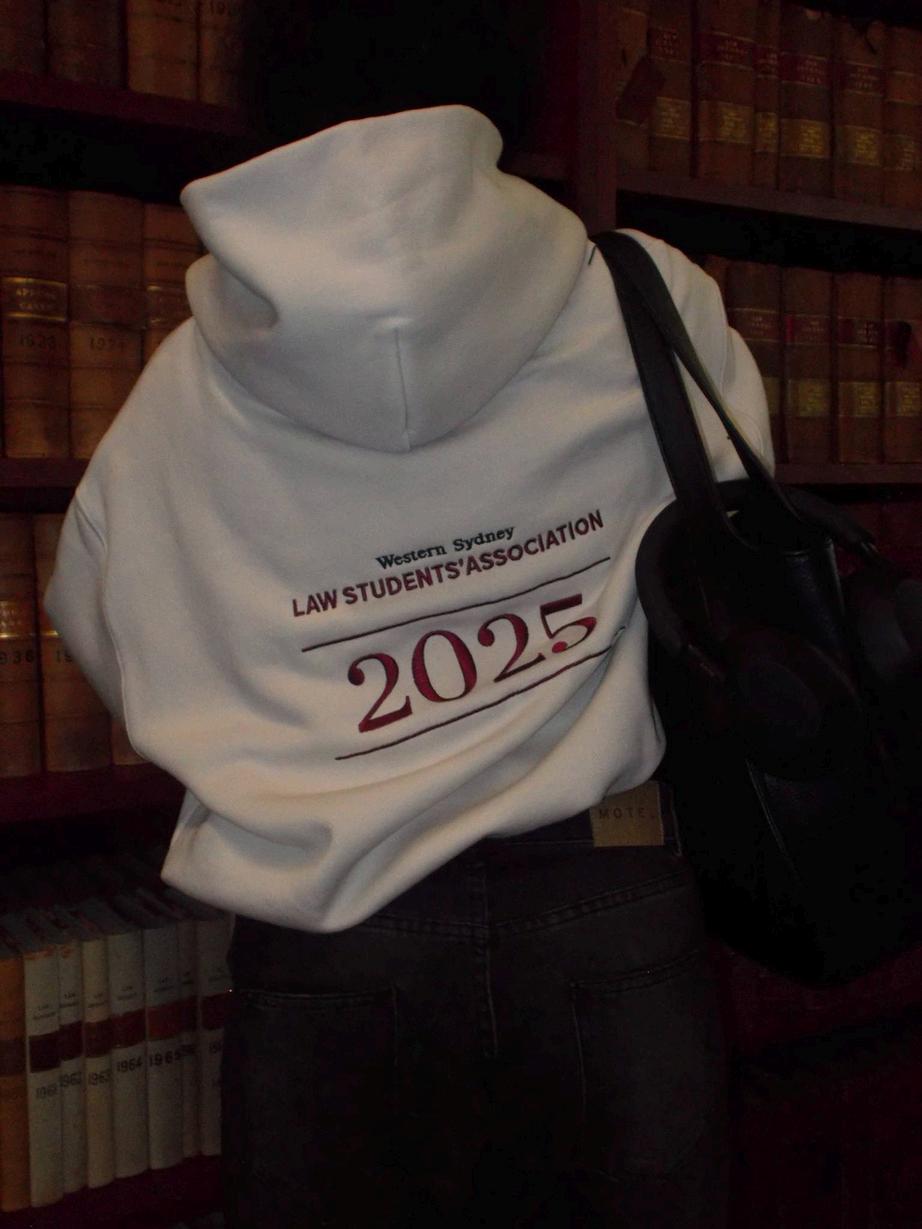

2 0 2 5 C A R E E R S G U I D E



2 0 2 5 C A R E E R S G U I D E
This issue of the 2025 Career’s Guide is a reflection of the passion, hard work and collaboration of members of the Western Sydney Law Student’s Association. The publication is purposed to assist law students across the faculty in their career endeavours. We would like to send our thanks to our sponsors for their ongoing support of the community and the Western Sydney University School of Law for their Guidance.
The Western Sydney Law Students’ Association (WSLSA) acknowledges the Traditional Owners throughout Australia and recognise their continuing connection to land, waters and culture. We pay our respects to Elders past, present and emerging.
We acknowledge that this was and always will be Aboriginal Land. We respect the knowledge that traditional elders and Aboriginal people hold and pass on from generation to generation, and acknowledge the continuous fight for constitutional reform and treaty recognition to this day
Ghada Haddad
Neveen Alam
Ghada Haddad
Neveen Alam
We thank the 2025 WSLSA Committee for their contributions



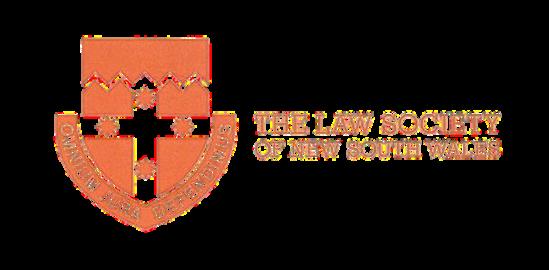



Wellbeing
WSU
WSU
WSU
LLB
Welcome to the WSLSA 2025 Careers Guide. I am delighted to present this year’s edition, designed to help you navigate the many pathways that a law degree can lead to.
A legal education provides more than just knowledge of the law It builds discipline, critical thinking, and the ability to approach challenges with clarity and purpose. These skills create opportunities across every corner of the profession, from commercial practice and advocacy to policy, community work, and emerging fields that continue to shape our future
As you read through this guide, I encourage you to bring your own experiences and opinions to explore your own pathway and what works best for you Especially today with the rise of technologies including AI, the legal professional sphere is constantly evolving, and with that comes the chance to carve out your own direction. Whether you are at the start of your journey or preparing for the next step, I hope these pages inspire you to pursue a career that reflects both your ambition and your values.
The Western Sydney Law Students’ Association (WSLSA) has experienced a year of extraordinary growth and achievement. What began as a small team of dedicated student leaders has flourished into a dynamic and multifaceted organisation, supported by executives, directors, subcommittees, and officers who together embody the diversity and ambition of our law school community.
In 2025, WSLSA has deepened its connections with leading firms, secured a record number of sponsorships, and hosted more firm-related events than ever before These milestones are more than achievements in themselves, they signal the strength of Western Sydney University students, the rising recognition of our talent within the profession, and the genuine commitment of our partner firms to invest in our futures The opportunities presented to our members this year demonstrate that the legal profession is eager to engage with Western Sydney University, and we are proud to serve as a bridge between students and the profession.
This Career’s Guide reflects the culmination of these efforts. It is designed not only as a showcase of potential career pathways but also as a practical tool to help you take the next step. We encourage you to explore firm profiles with curiosity, identify areas that align with your interests, and use the guide to prepare thoughtful questions for networking events and applications. Consider the diversity of practice areas represented here and reflect on how your own skills, values, and aspirations might find a home within them
Our hope is that this guide will empower you to approach your career journey with confidence Whether you are taking your first steps into law or preparing for job applications, this resource has been created with you in mind.
NEVEEN ALAM, TELIA JAGO, AHMED YAR KHAN, BETH BALAS
We are proud to present the 2025 WSLSA Careers Guide, a publication created to support and inspire law students as they explore the many directions their degree can take them. This guide reflects our ongoing commitment to providing resources that prepare students for the professional world while celebrating the diverse and ambitious community that makes up the Western Sydney Law School.
The release of this year’s guide comes at an exciting time for our community. With the Careers Fair only days away, we hope these pages help you prepare to meet potential employers, ask meaningful questions, and discover new pathways you may not have previously considered. The Careers Fair is one of the most valuable opportunities of the year to gain insight into the profession, build connections, and take active steps toward your future
Beyond the Fair, our calendar continues to offer moments of connection, learning, and celebration The upcoming Law Ball next month will give us the opportunity to come together as a community and recognise the achievements of our cohort. It also serves as a reminder of the friendships, growth, and memories that shape the student experience throughout law school We look forward to meeting as many students as we can!
Across every event, publication, and initiative, our shared goal remains the same. We aim to create meaningful opportunities for students to learn, engage with the profession, and feel supported as they transition from study into practice
We hope the 2025 Careers Guide encourages you to take the next step in your journey with confidence, curiosity, and excitement. The opportunities before you are endless, and we cannot wait to see where your path leads
GHADA HADDAD, JULIANA AZZI, BELLA NASH, HOUDA ABDUL ZAHRA
We are honoured to share this message as the Social Justice Officers of the Western Sydney Law Students’ Association. Our portfolio represents the voices of students from diverse backgrounds and experiences, and we remain committed to promoting inclusivity, understanding, and equity across every aspect of the law school experience
The study of law is grounded in the pursuit of fairness and justice, values that are central to our work within the WSLSA community. Through our initiatives, we aim to create spaces where all students feel seen, supported, and empowered to thrive. Whether it is through awareness campaigns, panel discussions, or community events, our goal is to amplify the perspectives of students with lived experience and encourage conversations that lead to meaningful change
The 2025 Careers Guide is an extension of this mission As you explore different career paths, we encourage you to consider how your identity, experiences, and values can become strengths in your professional journey The legal profession is enriched by diversity of thought and background, and it is through inclusion that true progress is made.
We aim to provide guidance to students with similar experiences and ot also be approachable to anyone who needs support or assistance alongside the university’s existing services
As we continue to work towards a more equitable future, we invite every student to engage with our initiatives and take part in building a law school community that reflects the diversity of the world we serve. Together, we can shape a legal profession that values empathy, respect, and representation
PUKAR WAGLEY, LAUREN HERSEY, NIROJINI ANANDANATHAN, TEISHA CLOOS
The Competitions Subcommittee has beeb a recent addition to the Western Sydney Law Student’s Association and we’re excited to see its positive influence on the development of our student community.
Mooting, as one of our core activities, serves as an invlauable platform for students to develop their legal reasoning, oral advocacy, and critical thinking abilities. Engaging in mooting not only helps students master the art of constructing legal arguments, but it also offers a real-world experience of courtroom dynamics. Whether you’re new to legal competitions or an experienced participant, the lessons learned through mooting extend far beyond the competition itself, providing a strong foundation for academic and professional success.
In addition to mooting, we also recognise the significance of other skills competitions such as negotiation and client interviewing. These events allow students to broaden their legal skillset by applying theory to practical scenarios. Skills competitions foster teamwork, problem-solving, and adaptability, qualities that are indispensable for any aspiring lawyer. By supporting students in these diverse areas, we aim to help them develop the well-rounded expertise needed to thrive in the legal profession.
The 2025 Careers Guide provides insights into the practical application of skills and highlights opportunities to explore different areas of the profession. Mooting and other competitions help bridge the gap between study and practice, giving you a competitive edge while fostering a sense of community and collaboration within the law school.
We hope this guide inspires you to explore your potential, participate in competitions, and embrace every chance to grow as a future legal professional.
As Ordinary Officers, we have had the privilege of witnessing firsthand the dedication, collaboration, and creativity that power the WSLSA. Behind every event, initiative, and partnership, lies a shared commitment that every Western Sydney law student has the opportunity to connect, grow, and thrive The past year has shown that WSLSA is more than a student association: it is a community that uplifts one another, celebrates collective success, and opens doors to the profession that once seemed distant.
Through our involvement, we have seen how each portfolio contributes to this growth. From careers and education to competitions, social justice, and wellbeing, every branch of WSLSA plays a role in shaping a well-rounded law student experience. The collaboration between teams, the constant flow of ideas, and the enthusiasm of volunteers have made 2025 a defining year of progress and innovation
The launch of this Careers Guide represents not only months of hard work, but also the values that make WSLSA special: inclusivity, ambition, and genuine care for our members’ futures. We hope it serves as a reminder that success in law takes many forms, form clerkships and advocacy to community service and leadership.
Each path is worth exploring, and every student has a place within our profession. We extend our gratitude to the executives, directors and partners who have supported WSLSA’s vision this year Most important, we thank our members for their continued engagement and trust.
Your drive inspires us to continue building bridges between Western Sydney University and the broader legal profession. Together, we look forward to another year of growth, opportunity, and connection.
Members of the Western Sydney Law Student’s Association were asked to submit one sentence of advice to their younger self. This is what they wished they would have known:
Stop waiting to feel ready Try everything, even when imposter syndrome convinces you that you don’t belong And remember that it’s okay to walk your path alone sometimes You’ll learn that your own strength can carry you further than you think Growth rarely looks graceful while its unfolding, One day, you’ll look back and realise that every uncertain first step, every late night, and every moment of doubt shaped the person you were becoming all along. It won’t always feel easy, but it will always be worth it.
NEVEEN ALAM, PRESIDENT
Just because your dream doesn’t work out in the exact way you envisioned, doesn’t mean it won’t work out at all.
BETH BALAS, SECRETARY
Academic knowledge is important, but life skills such as time management, effective communication and staying organised are just as crucial for success.
PUKAR WAGLEY, INTERNATIONAL INCLUSION OFFICER
Don’t be too hard on yourself, every challenge wull shape you, and the future is always yours to change.
HOUDA ABDUL ZAHRA, MARKETING DIRECTOR 2025
When facing barriers along your journey, don’t lose faith in your capabilities You deserve to be here, don’t limit your goals, keep trying, reach out for help and importantly, be kind to yourself.
SOCIAL JUSTICE PORTFOLIO
You have a high standard of expectation for yourself and that’s okay Continue to do everything to the best of your ability, but don’t let the “all or nothing” mindset consume you. Something is always better than nothing.
GHADA HADDAD, PUBLICATIONS DIRECTOR
Brighter days are ahead. I know it’s hard now and you feel like an outcast, but you will one day meet people that will love and accept you for who you are, that will make you forget about the people who put you down
LAUREN HERSEY, LGBTQIA+ INCLUSION OFFICER
Keep your heart kind, your dreams big and your faith steady Whatever you’re going through will shape your strength later on.
JULIANA AZZI, ENGAGEMENT DIRECTOR
Don’t be too hard on yourself, every challenge will shape you, and the future is always yours to change.
While I reflect on my journey so far, I realise how often I let overthinking and selfdoubt weigh me down. I spent so much time worrying about decisions that eventually sorted themselves out. Life has a way of unfolding, even if it doesn’t go according to the plan we set in our heads. In retrospect, I would remind myself that mistakes and setbacks are not signs of failure but essential steps in the process of growth.
The one thing that always helps us get from where we are to where we want to be is hard work. There were moments when I felt the challenges I was facing were unfair or too much to handle, but those were the same moments that helped me become more resilient. I would advise my younger self to trust the process since what seems like a setback now can actually be the very thing that creates opportunities tomorrow.
I would also remind myself that there is no way to change the past. Time simply goes on. How we use each day to create the life we want is what really counts. We still have control over the future, which is still full of opportunities.
So, the advice is simple, but effective: don’t overthink things, don’t be too hard on yourself, and have faith that everything will work itself out in the end.
HOUDA ABDUL ZAHRA, MARKETING DIRECTOR
Navigating university and various career journeys can be incredibly stressful and demanding. It's a time filled with pressure and overwhelm. Amidst endless assignments, job applications, and networking, it's easy to lose sight of your well-being and health. However, it's crucial to remember that your health is non-negotiable
Prioritising self-care during these busy times is essential not only for your mental and physical health but also for your overall success Take breaks, seek support when needed, and remember that your worth is not solely determined by academic or career outcomes Your wellbeing matters, always
Feeling overwhelmed by the demands of academic and career commitments/processes? You're not alone. Remember, if you're struggling to cope with the stress, there's support available both within and outside the university Don't hesitate to reach out for assistance – whether it's counselling services, peer support networks, or external resources, help is always at hand to guide you through this challenging time. There are a number of support services provided by Western Sydney University including:
The Counselling Service is a team of qualified social workers and psychologists who provide free, confidential counselling services as early as possible before studies are affected You can use the free Counselling Service for telephone or Zoom sessions, or contact us via our online eCounselling service
The Student Welfare Service offers advice and support on a range of financial issues, including tax help, textbook vouchers and emergency grants, as well as accommodation and health related issues. They can also assist with student advocacy needs. . Services are available over the telephone, on Zoom or via email welfare@uws.edu.au. You can also access our online Ask Welfare service
The Mental Health and Wellbeing site offers a number of resources which may help you maintain positive mental health and wellbeing. You may also use them if you are concerned about mental health changes for yourself, a family member, friend or colleague You will also find details of training which is available to staff and students to support others
If you require immediate support, please see below contact numbers of mental health services:


Internal and External Opportunities for Career Development and Growth

Rebecca Dominguez Director / Principal Solicitor WSU Justice Clinic
Could you provide a brief overview of the Justice Clinic, including its objectives and key components?
The WSU Justice Clinic is the university’s community legal service and the School of Law’s work integrated learning (WIL) program Practising lawyers in the Justice Clinic work on client cases and law reform and access to justice projects, run health justice outreach, provide community legal education, operate the university’s Student Legal Service (SLS), and teach the university’s clinical legal and internship subjects
The objective of the Justice Clinic is to provide valuable community service while simultaneously providing students with the opportunity to develop key professional and interpersonal skills, formulate a reflective and resilient professional identity before graduation, improve your employability and prospects, add value to the legal profession and future employers, and contribute to access to justice outcomes for current and future clients.
What unique skills and experiences do students gain from working in the Justice Clinic that make them stand out in the job market?
Doing a placement with the Justice Clinic helps students to make informed decisions about your academic and career paths, as well as stand out in the job market You gain quality practical work experience, add qualifications to your resume, develop skills, meet key people and mentors in the legal industry, boost your confidence, explore your interest in law and discover what resonates with you, learn more about job possibilities once you graduate, all which helps to secure jobs during your degree or after graduation.
The exposure to everything from our courts to our prison system to our vulnerable communities to our law reform processes to understanding how law and lawyers work in reality, gives you a unique experience and skill set Our focus is on developing lawyers who are client-centred, able to actively listen and communicate well with clients and colleagues, focused on working collaboratively and across disciplines, interested in making a difference regardless of where you work, and able to take care of yourself by maintaining balance and personal wellbeing All of these qualities are highly sought after and appreciated by employers who have gone on to employ our graduates!
How does the Justice Clinic offer practical, handson training that complements students' academic studies?
The Justice Clinic is a unique opportunity at university to gain real life work experience working in a legal setting while also learning about how to form your own professional identity, develop professional skills, and critically analyse the law in action. You work on real client cases with practicing lawyers, meet clients and community partners, and contribute to impactful research and law reform projects that provide real outcomes to community The work we do in the Justice Clinic intersects with each of your Priestly 11 and is an opportunity to see how the law works in action compared to the theory you have been learning about for so long!
How does participating in the Justice Clinic help students in their career development? Can you provide specific examples or success stories?
Students can participate in the Justice Clinic through either a clinical legal placement or legal internship placement, which helps career development in many ways
In the clinical legal placement, students work 1 day per week in the Justice Clinic with our lawyers on SLS and other client matters, undertake the Clinic’s legal research and law reform work, go on guided prison and court visits, and do health justice outreach to community partners Students are given academic credit toward their law degree, invaluable work experience in a community legal setting, and Practical Legal Training (PLT) credit where eligible
In the legal internship placement, students are placed with an external host to complete 12 days of a work placement while undertaking the elective subject for academic credit through the Justice Clinic which involves modules, seminars and assessments. Our hosts offer a wide range of diverse legal experience including practicing criminal lawyers, large corporates, commercial and family lawyers, human rights practitioners, medical and health hosts, intellectual property attorneys, community legal centres, and specialist firms.
There are multiple success stories with our Justice Clinic students going on to roles in top tier law firms, government departments, the legal assistance sector and law reform roles, all guided and informed by their time in the Justice Clinic
For further insight into the impact on career development you can read more from our students in the Australian Pro Bono Centre’s publication, ‘Western Sydney University Justice Clinic: forming a pro bono ethos in young lawyers’ (Pro Bono Voco, November 2023), available here
You can also look out for news from our newly established Justice Clinic Alumni Network (JCAN), which is shaping up to be a vibrant community network, reconnecting former students, fostering professional relationships, and celebrating the impact of our alumni in their chosen endeavours.
Can you provide some details about the application process for the Justice Clinic and any tips for prospective applicants?
While we would love to be able to offer a Justice Clinic placement to all students, places are limited and we are currently restricted to offering places only to final year law students closest to graduation who have completed enough credit points and certain pre-requisites
Toward the end of each semester, students are invited to submit an Expression of Interest (EOI) outlining their interest in either a clinical legal placement or legal internship placement The Director of the Justice Clinic and other supervising lawyers and staff select the applicants on the basis of these EOIs
The best tip I can offer is for a student to be your authentic self in your application, write in your own voice which shows your own personality and true passion or desire to discover that passion, and demonstrate a genuine interest in and knowledge of the work of either the Justice Clinic or the internship host you have chosen. No previous work experience is necessary – we love to welcome everyone to experience the Justice Clinic and learn how to be a practicing lawyer in a safe, fun and nurturing environment.

Western Sydney University offers a comprehensive suite of services to support students and recent graduates in navigating their career paths. Whether you're seeking part-time employment, internships, or full-time roles, the university's Careers and Employability team is dedicated to helping you succeed
The university's Careers and Employability portal provides access to a wide range of job opportunities. These listings are regularly updated and are tailored to various fields of study, ensuring that students can find positions that align with their academic backgrounds and career aspirations
In addition to job listings, the portal offers resources to assist with the application process. This includes guidance on crafting effective resumes, writing compelling cover letters, and preparing for interviews. By utilising these resources, students can enhance their employability and increase their chances of securing desired positions.
Through logging in with your student ID, you can access a range of resources:
Resume advice, workshops and reviews here
Cover Letter workshops, resources and reviews here.
Selection Criteria workshops, resources, and an activity to think like a recruiter here
Career toolkit for graduates and students here.
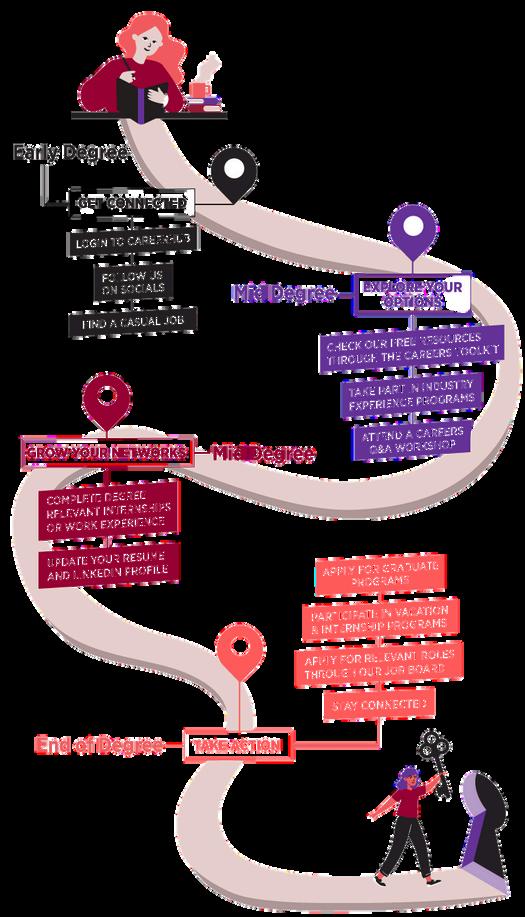
Interview related workshops, resources, interview attire, mock interviews, assessment centres, psychometric testing and information for the STAR interview technique here

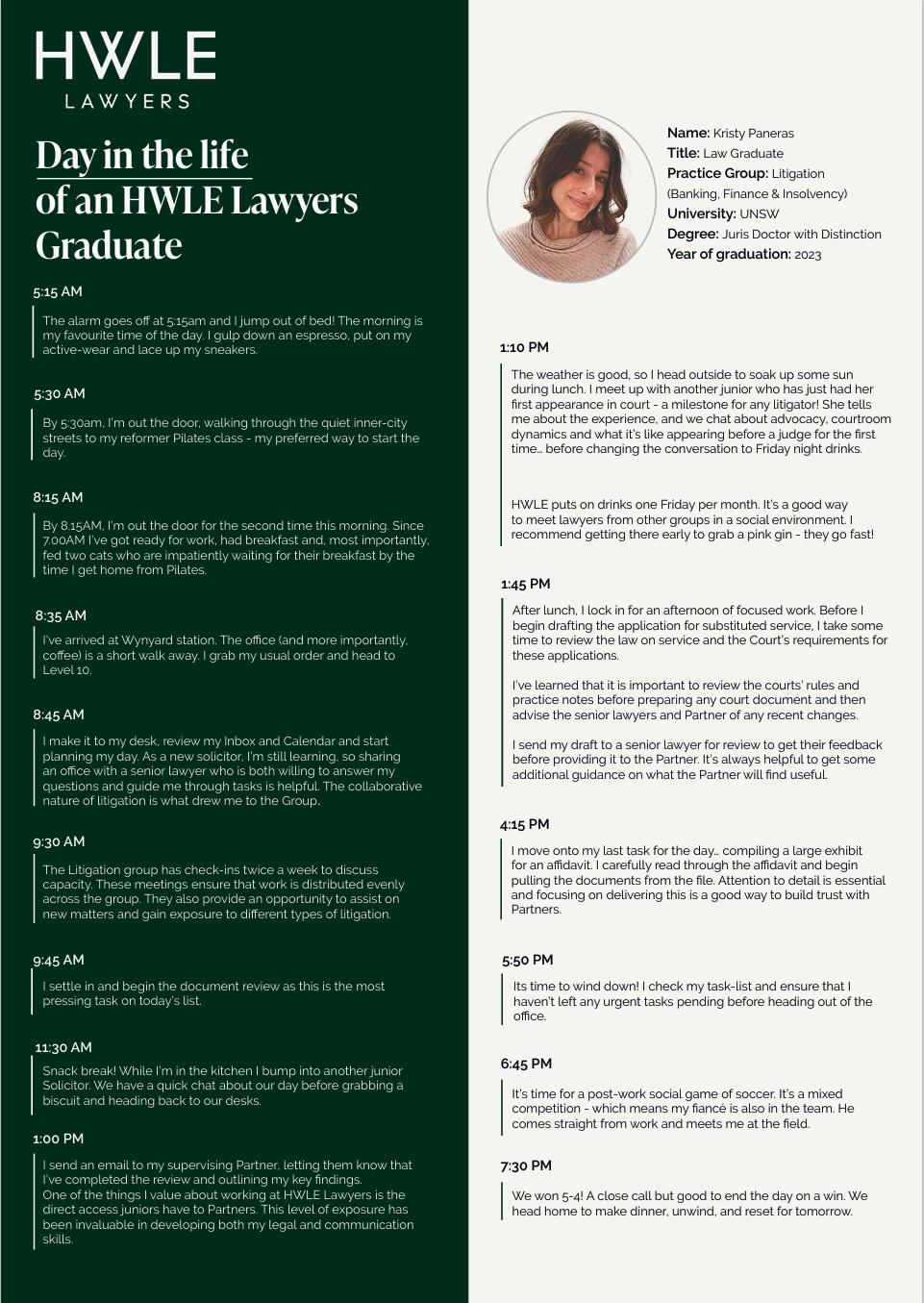
Honours in Law is a special commendation that appears on your University degree and academic record Rather than ‘B Laws’ after your name, your degree is listed as ‘B Laws(Hons)’ It is a distinguishing feature that stays with you for life
Unlike other courses, Honours in Law does not require an extra year of study – Honours takes the place of three alternate subjects in your final year of study (‘embedded’ Honours rather than ‘end-on’ Honours) Honours is a year-long course of study but is broken into two subjects
From 2022, all Honours students will need to complete the subject LAWS4016 Legal Research and Methodology in Autumn (10 credit points) and the subject LAWS 4011 Law Honours Dissertation (20 credit points) in Spring.
Enrolment in Honours is by application only In line with Western Sydney University’s Honours in Bachelor Awards Policy, admission into the Law Honours program is not guaranteed for applicants who meet the criteria to be considered for admission. Applicants for the Honours program can be ranked on the basis of their entry marks if the Dean of the School indicates the number of applications exceeds the availability of supervised places.
There are three ‘Levels’ to Honours:
Honours First Class
Honours Second Class, Division 1
Honours Second Class, Division 2
Through the support of a supervisor, you towards a dissertation of between 8,000 and 12,000 words on a topic of legal significance, marked by two independent examiners.
Pursuing honours allows you to deepen your knowledge, develop advanced research and analytical skills, and gain a competitive edge for future study or professional opportunities.
If you are interested in Honours in Law, then you should see whether you are eligible to apply. You need to show the likelihood of having an Honours Weighted Average Mark (HWAM) of at least 70 at the time of graduation
{See the FAQ page and the AAM/GPA Ready Reckoner for more information on how to conduct these calculations.}
If you are be eligible, then you need to consider a research topic and a possible supervisor Students may select from a list of topics set by the School of Law
You can write to an academic staff member directly to arrange a consultation or you can write to the Law Honours Coordinator lawhonours@westernsydney.edu.au, who can make suggestions on possible supervisors.
Western Sydney University offers a broad range of Alternate Units, which are a great way to explore areas of interest Elective units are particularly significant because they allow you to tailor your academic experience to align with your career goals.
By selecting units that focus on specialised areas of law, you can build expertise in fields that are directly relevant to your desired career path This not only enhances your knowledge but also makes you more competitive in the job market, as you develop a unique skill set that distinguishes you from others.
Access to Justice Clinic
Advanced Family Law
Advanced Taxation Law
Advanced Torts and Civil Wrongs
Advocacy
Animal Law
Anti-Discrimination Law
Australian Competition Law
Australian Consumer Law
Banking and Securities Law
Bioethics
Children’s Rights: Local and International
Comparative Law: Legal
Systems of the World
Conflict of Laws
Construction Law
Corporate Governance
Cyber Law and Justice
Designing Law Apps for Access to Justice
Drug Policy and Law
Elder Law
Family Dispute Resolution
Family Law
Financial Services Law
First Peoples and the Australian Legal System
First Nations Peoples’ Access to Justice Clinic
Foundations of Chinese Law
Indonesia: Law Governance and Culture
Law, Culture and
Entrepreneurial Innovation in India
Gender and the Law
Globalisation, Law, Governance and Culture
Human Rights and the Asian Pacific
Human Rights Law
Immigration Law
Independent Study (Law)
Information and Data
Governance Law and Regulation
Insolvency Law and Policy
Intellectual Property
International Business
Transactions Law
International Criminal Law
International Environmental Law
Islam, International Law and Human Rights
Issues in the Criminal Justice System
Judicial Internship
Jurisprudence
Law, Economics, Ethics and Change
Law and literature
Law and Public Policy
Law of Employment
Law of International Organisations
Law of the Sea
Law of War
Law’s Self -Understanding Legal, Economic and Social
Transformation in Taiwan
Legal Internship
Legal Research and Methodology
Managing Legal Risk in
Construction Law
Media Law
Mediation
Medical Law
Mental Health Law
Moot Court
Planning and Environment Law
Public Health Law
Public International Law
Refugee Law
Regulatory Risk and Compliance
Revenue Law
Sel-Managed Superannuation and Trusts
Space Law - Commercial Aspects
Sports Law
Street Law Clinic
Technology, Innovation and the Law
Wills and Succession
Work Health and Safety Law
Similarly to the LLB Program (Bachelor of Laws) Western Sydney University also offers a range of subjects for its JD students (Juris Doctor). Subjects both parallel and differ from those offered in the LLB program, as outlined below.
The JD Alternate Subject Pool is comprised of the Professional Subject Pool, the Research Subject Pool, and the JD Alternate Subjects, as shown below
Technology, Innovation and the Law
Designing Apps for Access to Justice
Judicial Internship
Elder Law
Legal Internship
Revenue Law
Advanced Legal Negotiation
Moot Court
Advocacy
Issues in the Criminal Justice System
Legal Research Project 1
Legal Research Project 2
International Corporate Governance
International Environmental Law and Policy
Bioethics
Information and Data Governance Law and Policy
International Human Rights Law
International Criminal Law and Justice
International Space Law - Commercial
Aspects
Principles of International Law
Australian Migration Law
Australia’s Visa System 1
Australia’s Visa System 2
Work Health and Safety Law
Law of Employment
Wills and Succession
International Banking and Finance Law
Family Law
Mediation
Self-Managed Superannuation and Trusts
Construction Law
Medical Law
Legal Research Dissertation
Intellectual Property
Visa Cancellation and Review
Law and Literature
Sports Law
Law and Public Policy
Plannign and Environment Law
Children’s Rights: Local and International
Media Law
Animal Law
Managing Legal Risk in Construction Law
Law of Construction Delay and Disruption
Remedies in the Construction Context
Contemporary Issues in Taxation
Financial Advice (Regulatory and Legal
Obligations)

William Roberts Lawyers commenced in Sydney on 1 July 2005, under the guidance of founding Principals, Robert Ishak and Bill Petrovski William Roberts has a unique connection with Western Sydney University in that all members of the board are alumni of the University's Law school.
William Roberts Lawyers is a dynamic, innovative and award-winning law firm with a focus on dispute resolution and litigation.
We have approximately 90 staff in total, including 65 talented lawyers with offices in Sydney, Melbourne, Brisbane, and Singapore.
Our practice areas: insurance disputes, class actions and general commercial litigation.
As a commercial litigation firm, we are renowned for our innovative thinking in delivering client solutions through transparent client practices; effective client costing structures; and smart resourcing decisions.
William Roberts Lawyers have been finalists or won the following awards: Top Specialist Firm 2025, Doyles Guide 2025 Leading Class Actions Lawyer – Ding Pan, Lawyers Weekly Senior Associate of the Year 2024 – Muska Namdar, finalist Lawyers Weekly Insurance Team of the Year 2025 & 2024, Finalist Lawyers Weekly Insurance Partner of the Year Award 2024 for Brian Silva, Australian Lawyer, Employer of Choice 2024; Winning Lawyers Weekly Insurance Team of the Year 2023; a finalist in the Lawyers Weekly Class Actions Partner of the Year Award 2023 for Ding Pan, and a finalist in Lawyers Weekly 30 under 30 awards 2023 for Joseph Braverman and Robert Ishak - Australasian Lawyers, Most Influential Lawyer – Changemaker 2021.
For our team, we provide a supportive work environment, stimulating work and close mentoring by experienced lawyers.
Please drop by our stand at the expo for the opportunity to speak to our talented team and ask any questions on what is involved in the day to day of a lawyer.
'Develop a passion for learning. If you do, you will never cease to grow' - Anthony J. D'Angelo


Practical Legal Training, Admission, Practice and Post-Graduation Opportunities
Upon completing your law degree, the journey to becoming a practicing lawyer in Australia requires one final, essential step: Practical Legal Training (PLT). PLT is a structured training program designed to bridge the gap between academic study and the practical skills needed in the day-to-day practice of law Successful completion of a PLT program is mandatory for admission as a legal practitioner and typically leads to the award of a Graduate Diploma of Legal Practice (GDLP), which qualifies you to apply for admission to the legal profession in your jurisdiction
In New South Wales, the PLT program comprises both structured training and supervised workplace experience
The structured training focuses on essential skills and knowledge areas that are crucial for legal practice, including:
Lawyer Skills:
Ethics and Professional Responsibility
Civil Litigation Practice
Property Law Practice
Commercial and Corporate Practice
In addition to these core areas, you can choose two electives from the following:
Administrative Law Practice
Criminal Law Practice
Family Law Practice
Consumer Law Practice
Employment and Industrial Law Practice
Planning and Environmental Law Practice
Wills and Estates Practice
Banking and Finance Practice
Another critical component of PLT is workplace experience, which requires approximately 75 working days (15 weeks) of supervised experience in delivering legal services. This hands-on experience allows you to apply the skills and knowledge gained during your PLT in a real-world setting, further preparing you for your legal career.
Some universities integrate PLT into their law degrees, allowing students to complete this requirement as part of their studies. However, WSU does not offer PLT, so you will need to complete it through an accredited provider
In New South Wales, PLT providers include:
The College of Law: One of the most popular PLT providers, offering flexible online and oncampus options.
University of New South Wales: Provides PLT as part of its postgraduate offerings
University of Technology Sydney: Provides a comprehensive PLT program with a focus on practical skills
If you are aiming to practice law in Australia, PLT is not just a formality; it is a vital step in ensuring that you are fully prepared for the demands of legal practice.
It equips you with the practical skills, ethical understanding, and real-world experience necessary to succeed as a lawyer By completing your PLT, you will be ready to take the final step toward your legal career applying for admission to practice law in Australia.
For more information on PLT visit: https://www.lawsociety.com.au/practi cal-legal-training
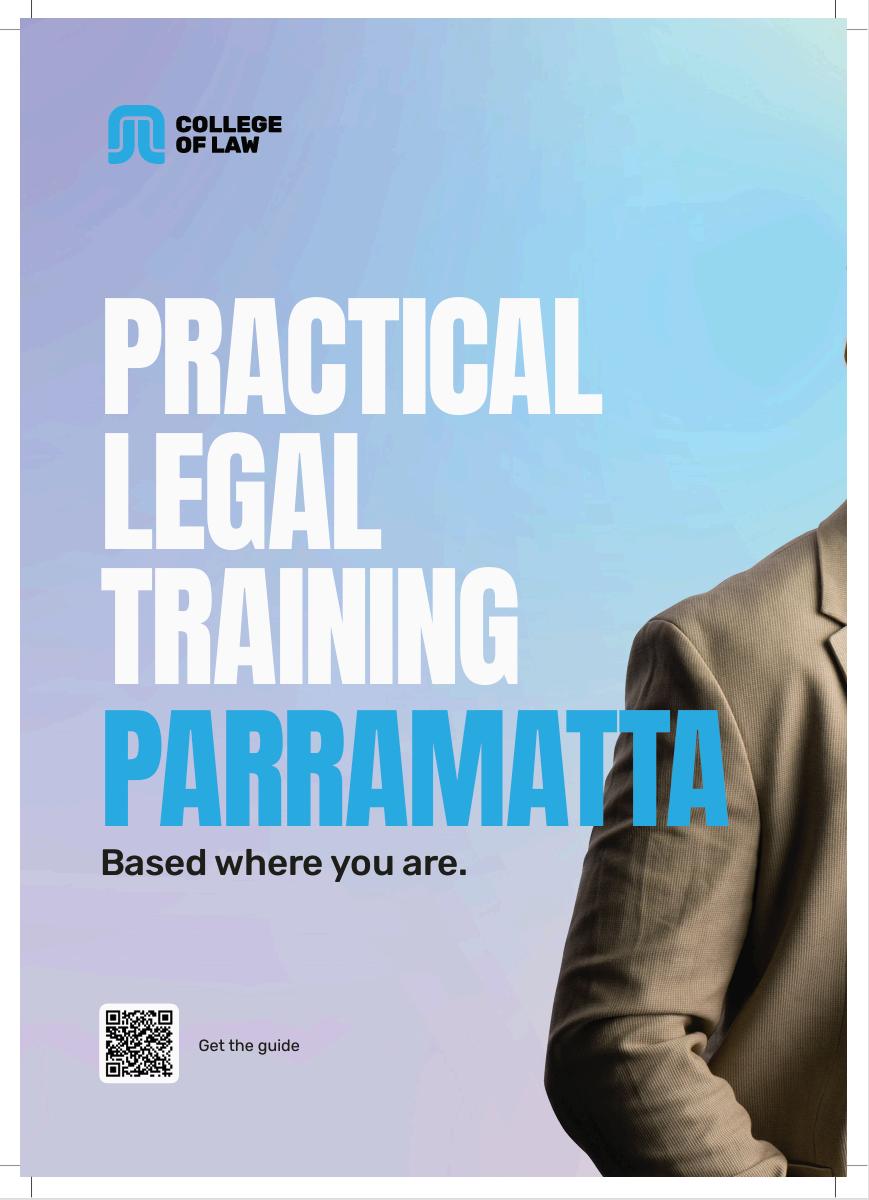
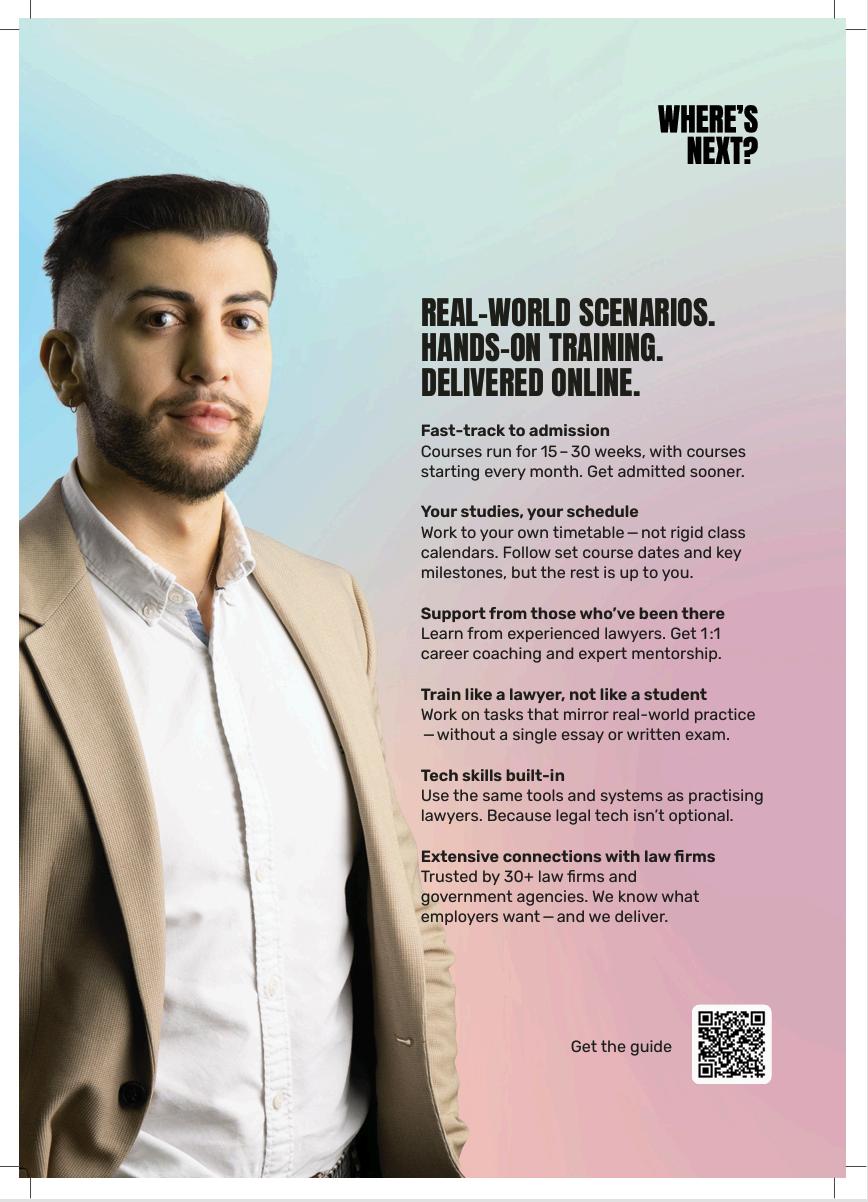
After completing your law degree and Practical Legal Training (PLT), you’re on the final stretch towards becoming a practicing lawyer in Australia. However, there are a few more important steps to ensure you meet all the requirements for admission to the legal profession. Here’s a comprehensive guide to help you navigate the admission process.
To be eligible for admission as a lawyer in New South Wales, you must fulfil the following requirements:
Completion of Academic Qualifications: You must have completed your Bachelor of Laws or an equivalent law degree
Completion of Practical Legal Training (PLT): Successfully finishing a PLT program, which awards you a Graduate Diploma of Legal Practice (GDLP), is mandatory. This training ensures you have the practical skills necessary for legal practice. Being a Fit and Proper Person: You must demonstrate that you are a fit and proper person to be admitted to the legal profession. This assessment considers your character, conduct, and any previous legal or disciplinary issues.
Once you have met the necessary academic and PLT requirements, the next step is to apply for admission through the Legal Profession Admission Board (LPAB) in New South Wales Here’s what you need to do:
Proof of Qualification: You will need to provide a Certificate of Completion from your PLT provider. This certificate confirms that you have completed all required coursework, work experience, and Continuing Professional Education (CPE) components Additionally, you must submit your official law degree transcript Application Submission: You will submit your application for admission to the LPAB, providing evidence of your academic and PLT qualifications The application process also requires you to disclose any conduct or issues that may reflect on your status as a fit and proper person
Compliance Certificate: If your application is approved by the LPAB, you will receive a compliance certificate. This certificate is necessary for the next stage of the admission process
After receiving your compliance certificate, you must attend an admission ceremony at the Supreme Court of New South Wales. The ceremony is a formal occasion where you will:
Take an Oath or Affirmation of Office: You will pledge to uphold the law and adhere to the ethical standards of the legal profession
Sign the Supreme Court Roll: Your name will be entered into the official Supreme Court Roll, formally recognising you as a lawyer
During the ceremony, your admission must be "moved" by a person already on the Supreme Court Roll or an Australian legal practitioner with a current practising certificate. If you are a PLT graduate, the College of Law may assist in arranging a mover for your ceremony
Once admitted, you must obtain a practising certificate to legally practice law in New South Wales. The practising certificate is issued by The Law Society of New South Wales and serves as a license to provide legal services
For more information visit: https://www.lpab.justice.nsw.gov.au/Pages/admission-lawyer/admissionlawyer.aspx OR https://www.collaw.edu.au/your-career/admission-to-practice
To practice law in New South Wales (NSW), you must meet the following requirements:
Be Admitted as a Lawyer: You must be admitted as a lawyer to the Australian legal profession This requires applying for a compliance certificate through the Legal Profession Admission Board (LPAB) in NSW A comprehensive guide for applicants is available on the LPAB website.
Hold a Practising Certificate: After being admitted, you need to obtain a practising certificate from the Law Society of NSW if you intend to practice as a solicitor Practising certificates are renewed annually, and the category of your certificate will depend on your intended area of practice. You can only hold one practising certificate at a time
The categories of practising certificates under Section 47(1) of the Legal Profession Uniform Law (NSW) are:
Principal of a law practice
Employee of a law practice
Corporate legal practitioner
Government legal practitioner
Volunteer
Legal practitioners in NSW can work within various practice structures, including:
Sole Practitioners: Account for a significant portion of the legal practice landscape
Law Firms: Defined as partnerships comprising only Australian legal practitioners or a combination of Australian legal practitioners and Australian-registered foreign lawyers.
Incorporated Legal Practices (ILPs): Corporations that meet certain criteria under the Uniform Law They must notify the Law Society 14 days before commencing legal practice
Unincorporated Legal Practices (ULPs): Partnerships or groups that must also notify the Law Society before engaging in legal practice
Community Legal Services: Non-profit organizations providing legal services, often to disadvantaged individuals, and may be insured through Lawcover.
Before engaging in legal practice, solicitors must hold or be covered by an approved insurance policy in NSW, typically available through Lawcover. Exemptions may apply to certain categories of solicitors, such as those in interstate or overseas practices
New practitioners are required to complete a period of supervised legal practice, generally 24 months full-time or equivalent part-time The supervision must be conducted by a legal practitioner holding an appropriate practising certificate The supervised legal practice condition remains on the certificate until a successful application for its removal is made after the completion of the required period
The Law Society of NSW provides various forms and resources to assist legal practitioners in meeting their compliance obligations, including guidelines for remote supervision and applications for exemption or removal of supervised legal practice conditions.
For more detailed information, you can access specific resources and guidelines provided by the Law Society and LPAB.
https://www.lawsociety.com.au/pra ctising-law-in-NSW/working-as-asolicitor-in-NSW



As a law student at Western Sydney University, you have access to a diverse range of postgraduate programs that can help you further your legal education and advance your career These programs build upon the foundational knowledge gained during an undergraduate degree, allowing students to develop a higher level of understanding and specialisation within their field Postgraduate degrees may include a graduate certificate, graduate diploma, masters degree or doctorate (PhD)
The Master of Laws (LLM) is a flexible postgraduate degree that allows law and nonlaw graduates to develop advanced, integrated, and contemporary knowledge in one or more areas of legal study Offering substantial coverage of the relevant professional and transdisciplinary aspects of the law, the LLM is a sophisticated degree that will significantly enhance your career expertise and prospects
Some key things to know about the LLM:
It helps you develop advanced legal research and writing skills, as well as the ability to critically evaluate complex legal issues.
The program offers a selection of minors for you to choose from including Legal Issues in Construction, Studies in Australian Migration Law, Finance and Tax Law, and Human Rights Law. This allows you to tailor the degree to your specific interests and career goals
If you have relevant prior study or professional experience, you may be eligible for credit, which can reduce the program's duration
It's important to note that this degree alone does not satisfy the academic requirements for admission to practise as an Australian lawyer But it' is an excellent option for those looking to take their legal knowledge and skills to the next level!
The Juris Doctor (JD) is a professional entry-level Master's degree that fulfils the academic requirements for admission to practise as an Australian lawyer This program is open to both domestic and international graduate students seeking a highly regarded law degree focused on employability across diverse legal and non-legal careers
Some key things to know about the JD:
It provides you with advanced, integrated knowledge of core legal practices, concepts, and broader perspectives about the law.
The JD program cultivates your development of professional skills including proficiency in problem solving, critical thinking, research, communication, collaboration, self management as well as ethical and professional awareness.
The program offers flexibility, allowing you to customise your studies by selecting from a wide range of specialised elective subjects, including the opportunity to study overseas
Overall, the Juris Doctor is designed to prepare graduate students like yourself for successful, versatile careers in law, with a strong emphasis on practical application and real world applicability
For more information visit: https://www westernsydney edu au/future/s tudy/courses/postgraduate
The Graduate Diploma in Australian Migration Law is a specialised program that equips you with the knowledge and skills needed to navigate the complex world of immigration and refugee law in Australia. This one of a kind program allows you to major in Australian immigration and refugee law, giving you the degree you need to help immigrants and refugees call Australia home
Some key things to know about the Graduate Diploma in Australian Migration Law:
The program is designed to give you a deep dive into the specific laws and policies governing migration and refugee law in Australia, including the Migration Act 1958 and the Migration Regulations 1994.
The program is taught by specialist immigration barristers and migration agents who have deep, hands on experience navigating the complexities of Australian migration law.
The program is fully accredited by the Department of Home Affairs, providing the necessary credibility and recognition for a successful career in migration law.
For more information visit: https://www collaw edu au/community/resources/how-to-become-alawyer-in-australia/
Private Law Practice, Public Law Practice and Alternative Careers


As you begin your journey into the world of legal careers, the path ahead is filled with exciting possibilities and important decisions. Whether you're drawn to the high-stakes world of private practice, the profound impact of public service, or the intellectual stimulation of academia, your legal education has equipped you with a powerful set of skills and knowledge that can open doors to a multitude of rewarding career paths
Private law refers to the area of law that governs and regulates the relationships and interactions between individuals, corporations, and other non-governmental entities. At its core, private law is about defining the rights, obligations, and liabilities that exist between private parties, outside of the direct involvement of the state Private law covers a diverse range of legal specialties, each offering unique opportunities for lawyers to advise and represent clients on their personal and commercial affairs.
Key Areas of Private Law:
Contract law
Property Law
Tort Law
Family Law
Commercial Law
Corporate Law
Let’s take a closer look at what a career in private law practice has to offer, and why it might be the perfect fit for you.
Contract law is the area of law that deals with the formation, interpretation, and enforcement of legally binding agreements between parties If you're the type of law student who is fascinated by the intricate details of how contracts are formed and the legal principles that govern them, then contract law could be an excellent specialisation for you to consider. Given that it is the foundation upon which so many of our commercial and personal relationships are built
Property law is the area of law that deals with the ownership, use, and transfer of both real property (land and buildings) and personal property (movable objects) As a property lawyer, you'll have the opportunity to guide clients through a wide range of legal matters, from property transactions and leasing to regulatory compliance and dispute resolution.
Tort law is an incredibly versatile and impactful field that deals with civil wrongs and the remedies available to those who have been wronged.
By specialising in this field, you'll have the chance to advocate for individuals and businesses in various cases, including personal injury, product liability, defamation, and nuisance claims. This area offers a diverse range of opportunities to make a real difference in people's lives
Family law is a deeply rewarding and meaningful area of practice, where you'll have the opportunity to support individuals and families during some of their most challenging moments. As a family lawyer, you'll play a crucial role in navigating sensitive issues like divorce, child custody, adoption, and domestic violence cases, ensuring your clients' rights are protected and their voices are heard.
As you begin your journey into the world of legal careers, the path ahead is filled with exciting possibilities and important decisions. Whether you're drawn to the high-stakes world of private practice, the profound impact of public service, or the intellectual stimulation of academia, your legal education has equipped you with a powerful set of skills and knowledge that can open doors to a multitude of rewarding career paths
Commercial law is a broad field that encompasses the legal aspects of business transactions and operations It deals with the rights and responsibilities of businesses, their interactions with customers, suppliers, and other commercial entities.
Let’s take a closer look at some of the key areas of commercial law, and why it might be the perfect fit for you.
As a banking and finance lawyer, you'll handle a variety of transactions, from property development to M&A Your responsibilities will include drafting Banking and Finance financial agreements, managing due diligence, advising on debt capital markets, and ensuring regulatory compliance
In taxation law, you'll be tasked with helping clients navigate the intricate web of tax regulations, from income tax and capital gains tax to crossTaxation Law border taxation Your role will involve conducting extensive research, identifying relevant legislation, and developing strategies to minimise your clients' tax risks and ensure compliance.
As a competition lawyer, you'll ensure fair market competition by advising clients on compliance and representing them in disputes with Competition Law regulators like the ACCC. This involves analyzing market conditions, assessing merger impacts, and negotiating settlements
Construction Law
If you choose a career in construction law, you'll be responsible for handling the legal aspects of major infrastructure and real estate projects. This could include drafting and negotiating contracts, managing disputes between parties, and ensuring compliance with land use regulations and environmental laws.
If you thrive in a fast-paced, highstakes environment, commercial litigation could be the perfect fit. You'll represent clients in complex Litigation and Dispute Resolution commercial disputes, using your legal expertise and negotiation skills to achieve the best possible outcomes, whether through court proceedings or alternative dispute resolution methods.
As an employment lawyer, you'll be responsible for advising clients on a wide range of workplace related matters, from drafting employment Employment Law contracts and policies to representing them in disputes over discrimination, workplace safety, and modern slavery issues This area is largely governed by the Fair Work Act 2009 and the Work Health and Safety Act 2011.
Intellectual Property works, and branding. Your role may involve registering and defending patents, trademarks, and copyrights, as well as negotiating licensing agreements
In the dynamic field of intellectual property law, you'll help clients protect their valuable intangible assets, such as technology, creative
As you begin your journey into the world of legal careers, the path ahead is filled with exciting possibilities and important decisions. Whether you're drawn to the high-stakes world of private practice, the profound impact of public service, or the intellectual stimulation of academia, your legal education has equipped you with a powerful set of skills and knowledge that can open doors to a multitude of rewarding career paths
Corporate law, on the other hand, is more focused on the legal structure and governance of business entities It deals with the formation, organisation, and management of corporations, partnerships, and other business organisations.
Let’s take a closer look at some of the key areas of corporate law, and why it might be the perfect fit for you.
In the fast-paced world of M&A, you'll have the opportunity to facilitate highprofile corporate transactions, which involve businesses coming together Mergers and Acquisition through mergers or acquisitions to achieve strategic goals Your role will include negotiating deal terms, conducting due diligence, and drafting the necessary legal documents to ensure a smooth and successful transaction.
Real estate lawyers play a crucial role in the buying, selling, leasing, and development of commercial and residential properties. Your responsibilities may include handling conveyancing, managing property finance, and navigating land use regulations to help your clients achieve their goals. As a real estate lawyer, you'll provide strategic advice to guide clients through complex transactions and ensure their investments are protected
As a corporate lawyer in competition and consumer protection, you'll ensure clients comply with complex regulations. This involves advising on mergers' competitive impacts, reviewing consumer-facing policies, and proactively identifying legal risks to implement compliant strategies that balance client interests with market and consumer needs
If a company is facing financial difficulties, you'll be the one to guide them through the complex legal process of debt restructuring, Restructuring and Insolvency
bankruptcy, or liquidation Your role will involve advising on the optimal way to manage debt and assets, as well as representing the company or its creditors in the insolvency proceedings.
As a corporate lawyer, you'll be responsible for shaping the legal structure and governance of businesses, from startups to Corporate multinational corporations. This could involve everything from the formation and organisation of companies to ensuring compliance with corporate regulations and advising on strategic decisions.

Enjoyaoneyear structuredprogram withextensiveon-the-job trainingandsupport incompletingPractical LegalTraining.
ElevateProgram providesregularlearning opportunitiesdesigned todevelopgraduates byprovidingskillsand expertisetoexcel.
Multiple rotations gives you the opportunity to gain experience in several of the firm’s practiceareas.
Astrongsupport networkincluding abuddy,mentorand supervisingpartner toprovideguidance throughouttheyear
LifeatHall&Wilcox offersarangeofbenefits andinitiativestosupport theholisticwell-being allofourpeople

Acomprehensive nationalinduction programwhichlays thefoundationfor theyearahead.
Opportunitiesto participateinprobono andSmarterLaw initiatives
HWEvolveisahybrid workplacewhereour peopleareencouraged andempoweredtowork flexiblybothremotely andintheoffice




FutureSkillsProgram Findoutmoreaboutthis programbysearching GraduateProgramat hallandwilcoxcomau

As you begin your journey into the world of legal careers, the path ahead is filled with exciting possibilities and important decisions. Whether you're drawn to the high-stakes world of private practice, the profound impact of public service, or the intellectual stimulation of academia, your legal education has equipped you with a powerful set of skills and knowledge that can open doors to a multitude of rewarding career paths
Public law refers to the area of law that governs and regulates the relationship between individuals, corporations and the government At its core, public law is about ensuring the government operates within the bounds of the law and is accountable to the people it serves. It covers a wide range of legal specialties, each offering the opportunity to make a profound impact on society.
Key Areas of Public Law:
Constitutional law
Administrative Law
Criminal Law
Human Rights Law
Environmental Law
Let’s take a closer look at what a career in public law practice has to offer, and why it might be the perfect fit for you.
The Commonwealth government employs lawyers across a variety of departments and agencies to provide legal advice, representation, and policy support. Some of the key roles include:
Litigation Officers: Manage litigation proceedings on behalf of agencies like the Australian Crime Commission, Australian Commission for Law Enforcement Integrity, and Australian Securities and Investments Commission
Legal Officers: Provide legal, strategic and operational advice to agencies such as the Attorney-General's Department, Australian Taxation Office, and Department of Defence
Legal Associates: Provide research and administrative assistance to judges in courts like the Federal Court and High Court
Policy Officers: Develop, review, and provide strategic advice on government policies and procedures for departments like the Department of Agriculture and Department of Health
Prosecutors: Prosecute criminal cases on behalf of the Commonwealth through the Commonwealth Director of Public Prosecutions
AGS Lawyers: The Australian Government Solicitor (AGS) provides comprehensive legal services to the Commonwealth government with roles inis a leading provider of legal services to the Commonwealth government, with roles in the Office of General Counsel, Dispute Resolution, and Commercial practice areas.
The NSW government also employs lawyers across various departments and agencies to support the state's legal and policy functions. Some of the key roles include:
Policy Officers: Contribute to policy development and implementation for the NSW government. This includes roles within the Department of Premier & Cabinet and Department of Planning and Environment
Legal Officers: Provide legal, strategic and operational advice to NSW government agencies such as the Crown Solicitor's Office and Independent Commission Against Corruption.
Solicitors: Provide legal services and representation for the NSW government This work is done through the Crown Solicitor's Office and Office of the Director of Public Prosecutions.
Crown Prosecutors: are barristers that prosecute serious criminal cases for the NSW government through the Office of the Director of Public Prosecutions.
Courts and Tribunals
As a law graduate, you may be interested in exploring opportunities to support the operations of our courts and administrative tribunals These roles allow you to gain valuable experience working at the heart of the judicial system
Legal Associates: Provide legal research and case management assistance to judges and justices in courts like the Federal Court and High Court of Australia They also advise and help manage the day to day functions of specialised administrative bodies, such as the Administrative Appeals Tribunal.
Prosecution Roles
Government prosecution agencies, at both the Commonwealth and state level, employ lawyers to independently prosecute criminal offences on behalf of the state.
Commonwealth Prosecutors: Prosecute federal criminal offences on behalf of the Commonwealth Director of Public Prosecutions. This role involves reviewing evidence, determining appropriate charges, and presenting the prosecution's case in court proceedings
Crown Prosecutors: Employed by the Office of the Director of Public Prosecutions, prosecute serious criminal matters in the NSW District and Supreme Courts. This role involves preparing court cases, representing the state government, and providing guidance to law enforcement agencies
Ombudsman Roles
For law graduates interested in public accountability and protecting citizens' rights, roles within Ombudsman offices can be a great option to consider These offices employ lawyers to investigate complaints about government agencies and ensure fair public administration.
Commonwealth Ombudsman: Lawyers working for the Commonwealth Ombudsman investigate complaints about Australian government agencies and handle inquiries to ensure fair and accountable public administration
NSW Ombudsman: Oversee and investigate complaints about state government departments and public sector organisations.
Regulatory Roles
Government regulatory bodies such as the ACCC (Australian Competition and Consumer Commission) and ASIC (Australian Securities and Investments Commission) allow graduates to directly contribute to protecting consumers, ensuring fair market competition and upholding financial service standards
The Public Law and Government Sub-Committee is a forum for lawyers and law students interested in public law The Committee engages a diverse membership to discuss the latest developments in this field. For more information visit: https://www.lawsociety.com.au/legalcommunities/NSW-young-lawyers/SubCommittees/Public-Law-and-Government
As a law graduate, you have a world of opportunities beyond the traditional legal route. The legal landscape is rapidly evolving, and firms are seeking innovative thinkers who can help them adapt and thrive in this new era Whether you have a passion for technology, business, policy, or something else entirely, there are so many ways you can leverage your legal expertise and skills
For those with a law degree, the academic path can be an incredibly rewarding and fulfilling career choice. Just imagine you’d get to dive deep into your passion for the law, conduct groundbreaking research, and share your knowledge with the next generation of legal minds Bonus: With your strong foundation in legal studies, you're already ahead of the curve.
The path to becoming a Legal Academic:
1 Earn an Honours Degree: This is the crucial first step. An honours degree will give you the solid foundation you need to tackle a PhD.
2.Earn a PhD: The PhD is the gold standard for academic roles It involves in-depth research and writing a dissertation Don't worry, with your law background, you've got a head start on the skills needed to succeed.
3.Build Your Research Portfolio: Whilst working on your PhD, focus on publishing articles in respected journals and preparing research reports This will help you stand out and establish your expertise.
4.Gain Teaching Experience: Look for opportunities to teach during your PhD or as a postdoctoral fellow This will not only improve your skills but also make you a more attractive candidate for academic positions.
5.Network and Connect: Join organisations like the Australasian Law Academics Association (ALAA) and the Council of Australian Law Deans (CALD) These will help you build a strong network and access valuable resources.
6 Explore Funding: Seek out grants and fellowships from groups like the Australian Research Council (ARC) to support your research efforts.
7. Share Your Work: Use platforms like the Legal Scholarship Network (LSN) to connect with the global academic community and showcase your research
Careers in Academia:
Tutor Lecturer Course Coordinator Researcher Dean Legal Careers Consultant
I know the journey may seem daunting, but with your determination and the support of your growing network, you can absolutely make it happen Organisations like the Higher Education Research and Development Society of Australasia (HERDSA) and the Australian Law Teachers Association (ALTA) can also provide valuable resources and connections along the way
For more information visit: https://www.westernsydney.edu.au/future/study/courses/postgraduate
As a law graduate, you have a world of opportunities beyond the traditional legal route. The legal landscape is rapidly evolving, and firms are seeking innovative thinkers who can help them adapt and thrive in this new era Whether you have a passion for technology, business, policy, or something else entirely, there are so many ways you can leverage your legal expertise and skills
In today's rapidly evolving legal landscape, the demand for innovative technological solutions is greater than ever before. Clients are becoming more sophisticated, seeking faster, more efficient, and more cost effective legal services Meanwhile, the rise of automation, data analytics, and emerging technologies is disrupting the traditional ways of practising law.
This is where you, as a legal technology professional, can truly shine By combining your deep understanding of the law with your passion for cutting-edge technology, you'll be uniquely positioned to bridge the gap between the legal and tech worlds. Imagine being the driving force behind the next game-changing legal tech solution, one that streamlines processes, enhances client experiences, and propels the industry forward.
The path to becoming a Legal Technology Professional:
If you are still studying...
Join student organisations focused on legal tech to connect with peers and gain hands-on experience
Incorporate relevant electives on topics like legal operations, innovation, and law and technology.
Seek out work integrated learning opportunities, such as internships in your university's law clinic
After Completing Your Law Degree:
Enrol in the College of Law's Practical Legal Training (PLT) program, which integrates innovation and technology.
Consider complementary qualifications, like a master's in legal tech or data analytics
Build your network by connecting with professionals on platforms like LinkedIn and getting involved with organisations like the Australian Legal Technology Association (ALTA)
Careers in Legal Technology:
Legal Technologist: Use your expertise to automate processes, develop innovative tools, and transform the way lawyers work Be the driving force behind game changing legal tech solutions.
Data Scientist or Data Analyst: Your key role would be to leverage your expertise in data analysis and legal knowledge to drive strategic, data-driven decision-making for law firms.
Privacy Engineer: Develop and implement robust solutions to safeguard sensitive information and ensure compliance with evolving data privacy regulations.
Legal Technology Entrepreneur: Turn your brilliant legal tech idea into a thriving startup Combine your law background and entrepreneurial spirit to drive innovation and make a lasting impact.
For more information visit:https://www collaw edu au/resources/2021/01/21/alternative-careerswhere-else-can-your-law-degree-take-you

